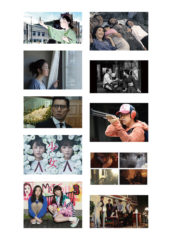ROUNDUP: Our Critic’s 2016 Top 10

Women Ascending the Stairs
Females take center stage in this year’s lineup, both behind and in front of the camera
The year 2016 has been among the happiest ever for the Japanese cinema, as far as box office returns are concerned. Shin Godzilla and especially Your Name have been performing monstrously well at the box office, despite some controversial concerns about the former. Also, while established auteurs have disappointed, there is a slow rise of younger filmmakers. It was also a relatively good year for women — not only female directors, but also female characters who are treated as actual beings with their own narratives. Here is my Top 10 list of theatrically-released Japanese films of 2016, all of which have been screened with English subtitles at festivals/special screenings, although too few of them in theaters.
10: At the terrace
 Multitalented writer-director Kenji Yamauchi brings his own acclaimed play “Trois Grotesques” to the screen. Presenting the play just as it is, the film reveals that the adaptation of an immoral, quarrelsome, bourgeois dinner-party drama with seven attendees can be as captivating as the original. The film might not be as intellectual and realistic as Bergman’s Scenes from a Marriage (1973), to which Yamauchi pays homage, but certainly it is the funniest picture of the year.
Multitalented writer-director Kenji Yamauchi brings his own acclaimed play “Trois Grotesques” to the screen. Presenting the play just as it is, the film reveals that the adaptation of an immoral, quarrelsome, bourgeois dinner-party drama with seven attendees can be as captivating as the original. The film might not be as intellectual and realistic as Bergman’s Scenes from a Marriage (1973), to which Yamauchi pays homage, but certainly it is the funniest picture of the year.
9: Japanese Girls Never Die
 Japanese cinema should make amends for its patriarchy system, and (male) filmmaker Daigo Matsui seems to understand this. Through rapid montages of colorful imagery, Matsui’s film is a postmodern attempt to reveal that Japan’s stereotype of “womanhood” is a false image. Both Yu Aoi and Mitsuki Takahata are excellent in their presentation of female suffering, and their desire to live someplace else, where they can actually be happy.
Japanese cinema should make amends for its patriarchy system, and (male) filmmaker Daigo Matsui seems to understand this. Through rapid montages of colorful imagery, Matsui’s film is a postmodern attempt to reveal that Japan’s stereotype of “womanhood” is a false image. Both Yu Aoi and Mitsuki Takahata are excellent in their presentation of female suffering, and their desire to live someplace else, where they can actually be happy.
8: Fake
 Tatsuya Mori again tackles a controversial issue in his latest documentary, about Mamoru Samuragochi, a famous deaf composer who turned out to be neither deaf nor a composer. On the surface, the film simply criticizes biased media coverage of the accused composer. However, Mori is cogent of the fact that any media, including his own film, can be as fake as any person in the world.
Tatsuya Mori again tackles a controversial issue in his latest documentary, about Mamoru Samuragochi, a famous deaf composer who turned out to be neither deaf nor a composer. On the surface, the film simply criticizes biased media coverage of the accused composer. However, Mori is cogent of the fact that any media, including his own film, can be as fake as any person in the world.
7: Night’s Tightrope
 It is hard to live through Japanese high school, especially an all-girls school. Based on Kanae Minato’s original novel, the film presents jealousy, marginalization and fragile friendships among schoolgirls in a disquieting manner. Rising female filmmaker Yukiko Mishima exerts a cinematic talent with an alluring visual sense and rich dialogue, convincingly turning teenage problems into philosophical questions.
It is hard to live through Japanese high school, especially an all-girls school. Based on Kanae Minato’s original novel, the film presents jealousy, marginalization and fragile friendships among schoolgirls in a disquieting manner. Rising female filmmaker Yukiko Mishima exerts a cinematic talent with an alluring visual sense and rich dialogue, convincingly turning teenage problems into philosophical questions.
6: I Am a Hero
 Can conservative Japanese production committees be bold enough to make an R-rated grotesque zombie comedy? Yes, they can, once in a while. Making full use of their interest in killings, zombies and other gonzo stuff, director Shinsuke Sato successfully reminds audiences that entertainment films can actually be entertaining, even when produced by a big Japanese studio. When’s the sequel?
Can conservative Japanese production committees be bold enough to make an R-rated grotesque zombie comedy? Yes, they can, once in a while. Making full use of their interest in killings, zombies and other gonzo stuff, director Shinsuke Sato successfully reminds audiences that entertainment films can actually be entertaining, even when produced by a big Japanese studio. When’s the sequel?
5: The Long Excuse
 Miwa Nishikawa’s long-awaited feature about an egoistical writer who cannot even feel sad about his own wife’s death is a joyful dramedy with a heart. Masahiro Motoki especially shines as the protagonist, convincingly and comically portraying hidden emotional aspects of the character through his self-destructive actions.
Miwa Nishikawa’s long-awaited feature about an egoistical writer who cannot even feel sad about his own wife’s death is a joyful dramedy with a heart. Masahiro Motoki especially shines as the protagonist, convincingly and comically portraying hidden emotional aspects of the character through his self-destructive actions.
4: Anohito: The One
 Longtime Shochiku producer Ichiro Yamamoto makes a directorial debut with this independent film, and it looks nothing like a Shochiku film. Shot in black-and-white and standard size, the film takes place at the end of the Second World War, but there is no nostalgic light in its small community, where a parentless child is being raised by several men. But it seems that the adults are controlled by the kid, and there are looming fears of Japan’s closed society, creating multiple layers of meaning. We’re keeping our fingers crossed for a second feature.
Longtime Shochiku producer Ichiro Yamamoto makes a directorial debut with this independent film, and it looks nothing like a Shochiku film. Shot in black-and-white and standard size, the film takes place at the end of the Second World War, but there is no nostalgic light in its small community, where a parentless child is being raised by several men. But it seems that the adults are controlled by the kid, and there are looming fears of Japan’s closed society, creating multiple layers of meaning. We’re keeping our fingers crossed for a second feature.
3: A Bride for Rip Van Winkle
 Shunji Iwai has finally returned with his first Japanese feature film since Hana and Alice (2004), and it is full of the Iwai signatures that we have all been waiting for. Haru Kuroki is a perfect match for the world of Iwai, as an insecure woman struggling in a life filled with technology, who finds a fragile friendship that will not last long. A Bride for Rip Van Winkle proves Iwai’s style of atmospheric filmmaking, with swooping camerawork and classical music, is still capable of producing a masterful work.
Shunji Iwai has finally returned with his first Japanese feature film since Hana and Alice (2004), and it is full of the Iwai signatures that we have all been waiting for. Haru Kuroki is a perfect match for the world of Iwai, as an insecure woman struggling in a life filled with technology, who finds a fragile friendship that will not last long. A Bride for Rip Van Winkle proves Iwai’s style of atmospheric filmmaking, with swooping camerawork and classical music, is still capable of producing a masterful work.
2: Harmonium
 Mr. Fukada goes to Cannes, and leaves with a major award. There hasn’t been more joyful news than this in 2016’s Japanese cinema. Tadanobu Asano plays the role of an outsider who villainizes an ordinary family, and the film presents the most violent of action, in an almost J-horror-like cinematic way, without directly depicting it. Like a Shakespearean drama, powerless individuals struggle against an unalterable fate. Fukada proves that a mandatory key to foreign festival success is not “Japanese” themes, but having a global consciousness (the film is also co-produced with France).
Mr. Fukada goes to Cannes, and leaves with a major award. There hasn’t been more joyful news than this in 2016’s Japanese cinema. Tadanobu Asano plays the role of an outsider who villainizes an ordinary family, and the film presents the most violent of action, in an almost J-horror-like cinematic way, without directly depicting it. Like a Shakespearean drama, powerless individuals struggle against an unalterable fate. Fukada proves that a mandatory key to foreign festival success is not “Japanese” themes, but having a global consciousness (the film is also co-produced with France).
1: In This Corner of the World
 It was the year of animation in Japan, as it always is. The greatest achievement of In This Corner of the World is its pursuit of a visual aesthetic depicting warm, tender images, although it takes place in Hiroshima during wartime. The film is sometimes episodic, depicting the daily mundanities of its housewife protagonist, whose plainness and placidity are extremely charming, with a perfect voiceover by Non. Director Sunao Katabuchi memorably presents the process of destruction, how life can collapse because of war. It is a true, sincere, emotional, subtle, powerful piece of work, without being steeped in any kind of ideology, reminding audiences how precious life is, even modest lives.
It was the year of animation in Japan, as it always is. The greatest achievement of In This Corner of the World is its pursuit of a visual aesthetic depicting warm, tender images, although it takes place in Hiroshima during wartime. The film is sometimes episodic, depicting the daily mundanities of its housewife protagonist, whose plainness and placidity are extremely charming, with a perfect voiceover by Non. Director Sunao Katabuchi memorably presents the process of destruction, how life can collapse because of war. It is a true, sincere, emotional, subtle, powerful piece of work, without being steeped in any kind of ideology, reminding audiences how precious life is, even modest lives.
By Kenta Kato
Kenta Kato is a Tokyo-based writer, film critic and festival programmer, currently working on a Master’s degree in Film Studies at Waseda University.
